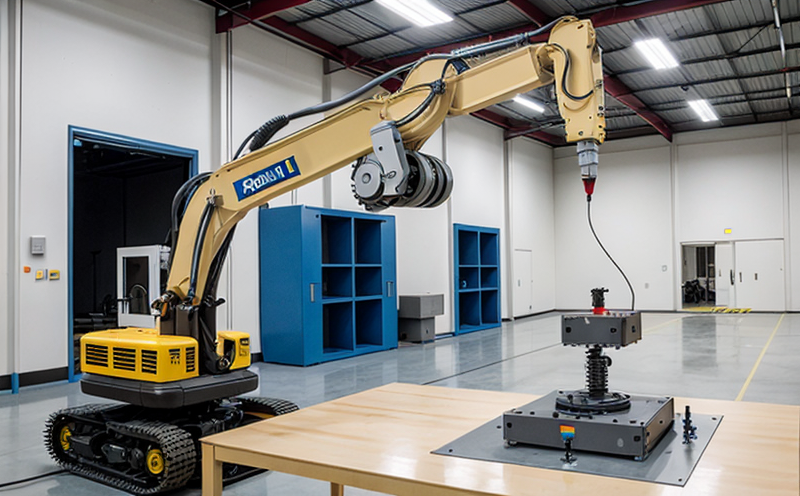ASTM D7818 Controller Integration Testing in Robot Systems
The ASTM standard D7818, titled "Standard Practice for Controlling Automated Test Equipment Using a Programmable Controller," is a critical benchmark for ensuring the reliability, accuracy, and safety of robotic control systems. This testing method focuses on integrating programmable controllers into robot systems to ensure that they function as intended without compromising performance or operational integrity.
This service involves several key components: specimen preparation, which includes calibrating sensors and actuators; the use of appropriate instrumentation such as motion control software and hardware; and a series of tests designed to meet specific acceptance criteria outlined in ASTM D7818. The goal is to ensure that controllers operate flawlessly within their intended environments, whether it's for industrial manufacturing, medical robotics, or autonomous vehicles.
The process begins with detailed analysis of the robot system’s requirements using industry standards like ISO 9001 and IEC 61508. This allows us to identify critical control points that need precise calibration and validation. Once these points are identified, we proceed with specimen preparation by setting up the necessary hardware components in a controlled environment.
Instrumentation plays a crucial role in this testing process. We utilize advanced motion control software and specialized hardware designed for high-precision applications. These tools allow us to simulate real-world conditions under which the robot will operate, providing an accurate assessment of how well the controller performs its tasks. Acceptance criteria based on ASTM D7818 ensure that all tests are conducted according to best practices and industry standards.
One of the primary objectives of this testing methodology is to guarantee consistent performance across different environments and conditions. This includes evaluating how temperature fluctuations, electromagnetic interference (EMI), and other external factors affect control accuracy. By conducting thorough evaluations under various scenarios, we can identify potential issues early on and address them before deployment.
Another important aspect of ASTM D7818 controller integration testing is ensuring compliance with relevant regulations and safety requirements. Compliance officers will find this service particularly valuable as it helps maintain regulatory adherence while also enhancing overall product quality through rigorous testing procedures. For R&D engineers, this service offers a platform to innovate within established guidelines without compromising on standards.
Quality managers looking for ways to improve operational efficiency can benefit greatly from this service by gaining insights into areas where improvements are needed based on test results. Procurement teams may also see value in this offering as it supports decision-making related to selecting appropriate controllers and components that meet specified performance levels.
Benefits
Implementing ASTM D7818 controller integration testing offers numerous advantages for businesses operating within the robotics sector. Firstly, it enhances system reliability by identifying any discrepancies between expected behavior and actual performance early in the development cycle. Secondly, this approach ensures that all components work harmoniously together as intended, reducing instances of malfunctions during operation.
A well-executed ASTM D7818 controller integration test improves safety standards significantly because it focuses on minimizing risks associated with improper functioning or unexpected behaviors. Additionally, compliance with recognized industry standards like ASTM D7818 builds trust among customers who expect high-quality products backed by robust testing methodologies.
- Enhanced Reliability: Identifying and rectifying issues before deployment improves long-term performance and reduces maintenance costs.
- Better Safety Standards: Ensuring that controllers meet strict safety requirements protects both personnel and equipment from potential hazards.
- Increased Customer Trust: Adhering to recognized standards helps build a reputation for delivering reliable and safe products.
For quality managers, this service provides detailed reports highlighting specific areas requiring attention. This information can be used to make informed decisions about improving processes or investing in new technologies. Compliance officers appreciate the structured approach provided by ASTM D7818 which ensures that all necessary checks are made during development.
Customer Impact and Satisfaction
- Better Product Quality: Through rigorous testing, we ensure that only high-quality products reach the market. This improves customer satisfaction by delivering reliable and dependable robotic systems.
- Informed Decision-Making: Detailed reports provided after each test allow stakeholders to make well-informed decisions regarding future developments or upgrades.
- Reduced Risk: By catching potential problems early on, we help reduce the risk of costly failures later in the lifecycle of a product.
The impact of ASTM D7818 controller integration testing extends beyond just technical aspects; it also contributes to building strong relationships with customers. When businesses consistently deliver reliable products backed by comprehensive testing procedures like those specified in ASTM D7818, they foster trust and loyalty among their customer base.
Use Cases and Application Examples
This service finds application across various industries where precision and accuracy are paramount. In the medical field, for instance, robotic arms used during surgical procedures must operate with absolute precision to ensure patient safety and successful outcomes. ASTM D7818 controller integration testing ensures that these systems function correctly even under challenging conditions.
- Medical Robotics: Surgical robots require precise control over their movements; any deviation could lead to serious consequences for patients undergoing treatment.
- Manufacturing: Industrial robots used in manufacturing processes need reliable controllers to ensure efficient production lines and minimal downtime. Testing according to ASTM D7818 helps maintain these stringent requirements.
In autonomous vehicle technology, accurate control over steering mechanisms and braking systems is essential for safe navigation on roads. By adhering to ASTM D7818 standards during development stages, manufacturers can ensure that their vehicles meet the necessary safety levels before release into public use.
Finally, in consumer electronics like drones or home cleaning robots, consistent performance is crucial for user satisfaction and product longevity. Properly integrated controllers guarantee smooth operation without unexpected stops or malfunctions, enhancing both usability and reliability.





